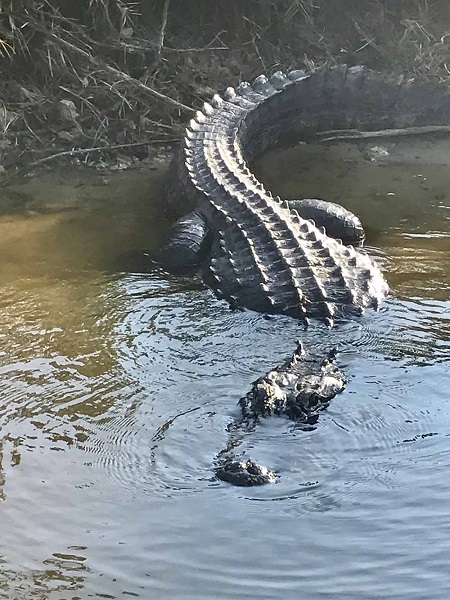
The Hancock-Henderson Quill, Inc.

Three years in the planning, two years of rejection by the National Park Service, and a one million dollar insurance policy later, La Harpe High School graduate Gregg Kane completed the first unassisted, unsupported and only solo bushwhack crossing of the Florida everglades on Nov. 20, 2018.
During the multi-year permit application process, Kane was summoned before Park rangers multiple times to explain the how's and why's of the trip, along with strategy sessions with park rangers on how to safely travel and sleep at night in a swamp where humans are nowhere near the top of the food chain.
Panthers, alligators, bears, venomous snakes, anacondas and boa constrictors, oh my!
Kane's original plan was to spend nights in his canoe, but rangers nixed that idea, calling it akin to presenting himself as a smorgasbord to top predators.
Discussions led to a breakthrough in safe sleeping that made the attempt survivable: a new tent-hammock hybrid from REI was now on the market:and it worked.
While predators could, and did, still hear and smell Kane, the hammock hybrid with rain fly got Kane off the ground at night and presented a confusing wall of fabric that predators could not understand.
Kane placed a trail cam outside at night and photographed numerous alligators, crocodiles and rats within feet of his hammock. And did we mention the mosquitos?

Kane originally planned to start the trip at the shark river observation tower on Nov. 10th, but was instead forced to put in at the old Flamingo ghost town due to low water levels.
His plan: alternatingly machete, paddle, pole and drag a canoe and gear about a 100 miles through the center of the "glades from North to South, exiting via Rookery Branch creek into the gulf of Mexico then turning north and paddling through open ocean to exit at the Park Service ranger station at Everglades City.
And 11 days later, he did just that, exhausted, dehydrated, sleep deprived and several pounds lighter.
Kane not-so-fondly recalls a couple harrowing experiences: Entering an area on the map labeled by Ponce De Leon in the 16th century as Hells Gate, a transition boundary between fresh and saltwater: a nearly impenetrable jungle of dense mangroves that had to be hacked through with a machete.
He also thought that once into the saltwater zone, he had left the danger of alligators behind, unaware of a small population of aggressive saltwater Crocodiles, one of which hunted him for 9 hours. Who knew that pepper spray would be ineffective in deterring these beasts?
Kane notes several factors contributed to his successful crossing: 2 years of physical conditioning and modern satellite imagery allowed him to plan a route that would be mostly water, an advantage Spaniard Ponce De Leon did not have on his failed attempt to cross the everglades in 1542.
Modern GPS units pinpointed his exact planned route and current location and a Satellite transceiver allowed Kane to send his coordinates morning and night to support staff at home.
Kane also bushwhacked during the darkest phase of the moon to reduce his vulnerability as prey, and he went during the highest water levels to minimize the amount of dry land and wading.
Early Antarctic polar expeditions were studied for insight into why extreme expeditions fail.
Gregg's mother, Mary Ann Kane, still lives on the family farm in rural La Harpe.
An experienced leader of international mountaineering expeditions, and President of Chicago Mountaineering, Gregg owns the Illinois River Winery and lives in Hinsdale, IL with his son Will.
To follow Greggs' expeditions, follow his public figure page on Facebook.